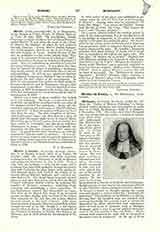

Moreto y Cabana, AUGUSTIN, Spanish dramatist; b. at Madrid, April 9, 1618; d. at Toledo, October 28, 1669. He received what little academic training he had at the University of Alcala de Henares and graduated Licentiate in Arts in 1639. From a very early age he began to write for the stage, and it is known that from 1640, probably through his friend-ship with Calderon, his plays began to be produced. The Spanish drama had reached the height of its success during Moreto’s boyhood, and a gradual decline had set in. The clergy began to preach against plays as they were then given, and in 1614 the Royal Council instituted radical reforms by reducing the number of dramatic companies, modifying stage costumes, and establishing a strict censorship. It was furthermore ordered that thenceforth no come-dies were to be played but those of an historical nature, or those dealing with the lives of the saints. This accounts for the fact that, for a time, Moreto devoted himself to this kind of drama. Like many famous writers of his time, Moreto received Holy orders toward the end of his life, though it is not known exactly when he did so. He entered the household of the Cardinal Archbishop of Toledo, Don Baltasar de Moscoso, and in 1659 joined the Brotherhood of St. Peter.
In 1654 twelve of his plays were published in. volume under the title of “First Part of the Come (of Moreto”. Among them may be mentioned ` lindo Don Diego”, “Los jueces de Castilla” deal with the life of Peter the Cruel, “San Franco Sena”, and “Trampa Adelante”.
As a writer, Moreto lacked the creative genius some of his contemporaries, but he excelled them in knowledge of stagecraft, in the power of coming quickly to the point in evolving his plots. He also celled in the variety of his characters and in depict human passions, while at character drawing he wa master surpassed by none. He handles a humor, situation with great delicacy of touch, and is at best in comedies of the lighter and gayer sort. best play “El desden con el desden” (Disdain r with Disdain), published at Valencia in 1676, is b rowed from Lope de Vega’s “Milagros del despreci (Scorn works Wonders), and is generally conceded be better than the original. Moliere, in his “Prince d’Elide”, tried to repeat Moreto’s success, but far short of his model. The “Biblioteca de Auto Espanoles” XXXIX (Madrid, 1856), contains collection of Moreto’s plays with a biography of author by Luis Fernandez Guerra.
VENTURA FUENTES

